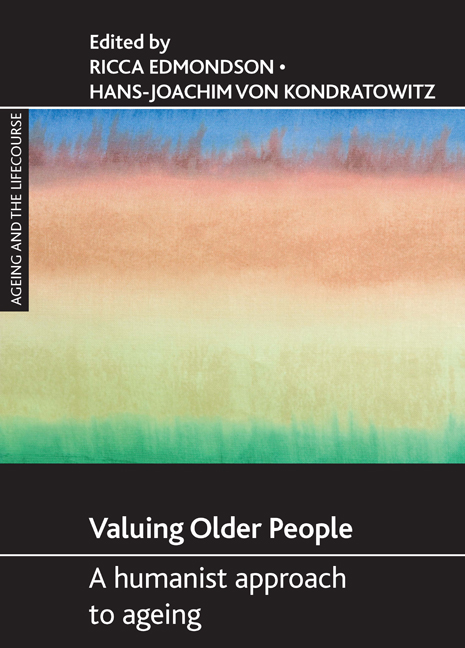Book contents
- Frontmatter
- Contents
- List of tables and figures
- Notes on contributors
- Acknowledgements
- Foreword
- Introduction
- Part One Religion, spirituality, cultural resources and creating meaning
- Part Two Norms, values and gerontology
- Part Three Ageing and wisdom? Conflicts and contested developments
- Afterwords
- Index
- Available titles in the Ageing and the Lifecourse series
ten - Engineering substantially prolonged human lifespans: biotechnological enhancement and ethics
Published online by Cambridge University Press: 05 July 2022
- Frontmatter
- Contents
- List of tables and figures
- Notes on contributors
- Acknowledgements
- Foreword
- Introduction
- Part One Religion, spirituality, cultural resources and creating meaning
- Part Two Norms, values and gerontology
- Part Three Ageing and wisdom? Conflicts and contested developments
- Afterwords
- Index
- Available titles in the Ageing and the Lifecourse series
Summary
Introduction
Substantial extension of the human lifespan has recently become a subject of lively debate. One reason for this is the completion in 2001 of the Human Genome Project and the experimental avenues for biogerontological research it has opened. Another is recent theoretical progress in biogerontology. In the 1990s more and more biogerontologists began to agree on the evolutionary cause of senescence: it results from a trade-off between the investment of resources in reproduction on the one hand and in maintenance and repair of the body on the other. This represents a powerful simplification of the theoretical underpinnings of biogerontological research, necessary to make anti-ageing technology a plausible idea (Hayflick, 1994; Holliday, 1995, 2006; Austad, 1997; Kirkwood, 2005).
But the character of modern culture is at least as important an explanation of the current debate on life-extension intervention. Three existential factors playing a role here are fear of death (fear of no longer existing), fear of the suffering involved in the process of dying, and the sometimes obsessive desire to preserve good health in order to pursue life projects and goals (Turner, 2004). The historical background of this motivational pattern is
… the decline since the Renaissance of faith in supernatural salvation from death; concern with the worth of individual identity and experience shifted from an otherworldly realm to the ‘here and now’, with intensification of earthly expectations. (Gruman, quoted in Post, 2004a: 82)
A specific occasion for strong interest in ‘anti-ageing medicine’ is the ageism many people seem to encounter in conventional medicine:
Anti-aging practitioners largely rebel against the age norms accepted by more mainstream medicine. In other words, for these practitioners, there is no ‘normal’ that should be accepted for a man of 72 years when, instead, we can targethis care toward the ‘norms’ of a 30 year old man. (Mykytyn, 2006: 282, emphasis in original)
Interest in substantial life extension is large, therefore, and in a volume on ageing and values such a project might easily be assumed to be worthy of support: if later life is good, more of it would be better.
But would this really be a good thing? Experience with other revolutionary technologies is that, once they exist, they can no longer be stopped. Too much has been invested in them: once research has produced an effective technology catering to all-too-human desires, there is seldom a return path.
- Type
- Chapter
- Information
- Valuing Older PeopleA Humanist Approach to Ageing, pp. 177 - 198Publisher: Bristol University PressPrint publication year: 2009



